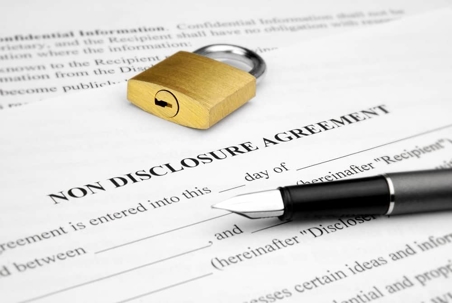It’s not every day you see boilerplate legal agreements splashed across the headlines, but nondisclosure agreements (“NDAs”) have attracted a great deal of media attention recently. The scandals that have shifted our focus towards NDA enforcement have raised more than a few eyebrows, as well as novel questions of law. After all, how can anyone really prevent another person from sharing information? And once secrets get out, what is the proper response for aggrieved parties to take?
NDA Form and Function
Nondisclosure agreements are contracts that legally restrict a person or business from disclosing certain information. NDAs are very common, and they are almost always executed when parties are engaged in business activities that may involve the disclosure of trade secrets or other economically-valuable information. Anyone who has been engaged to perform any services that involve the use of a company’s marketing, operational, development, or financial information should expect to be required to sign an NDA. However, parties are generally free to limit the disclosure of any confidential information.
NDAs are meant to protect valuable information, and they are most effective when tailored to suit the parties’ circumstances. First and foremost, this requires identifying the type and nature of the agreement. An NDA can take several forms, from unilateral to mutual or generalized to specific. The first step to ensuring compliance with the terms of a nondisclosure agreement is making sure all parties are clear on the NDA’s scope, form, and function.
A well-drafted NDA should include a clear statement of purpose and definition of what information must be held in confidence. It should also spell out any terms or procedures regarding the labeling, security, and permissible use of information covered by the agreement. And while parties to an NDA typically never intend for the secret information covered by the agreement to get out, an effective nondisclosure agreement must also include terms describing the procedures that apply to unauthorized disclosures of covered information.
A nondisclosure agreement is a contract, so anyone who violates the terms of an NDA is potentially liable for breach of contract. However, depending on the circumstances of the unauthorized disclosure, breach of a nondisclosure agreement can also give rise to liability for the misappropriation of trade secrets or copyright infringement. Any party seeking to enforce an NDA must prove that the agreement was in force at the time of breach, that the breach actually occurred, and that the aggrieved party was actually injured as a result.
Common Challenges to NDA Enforcement
The first potential challenge to enforcing an NDA is establishing that the agreement is valid. Just like any other legally-enforceable contract, an NDA will only be upheld by reviewing courts if it is supported by consideration. Parties to an NDA must receive some valuable benefit in exchange for their secrecy, such as a cash payment or employment opportunities that would not have been available otherwise. Likewise, the confidentiality of the information itself must be valuable in order to form the basis of an enforceable agreement. If an NDA is not supported by some type of legal consideration, it is not enforceable.
Nondisclosure agreements are subject to the same legal claims and defenses that apply to the breach of any other type of legal contract. However, unlike other types of contracts, NDAs function to prevent the disclosure of information that parties would otherwise be free to share. In the United States, freedom of speech is a dearly-held principle of law entitled to constitutional protection. As a result, NDAs must be careful to specify the exact information to be treated as confidential under the agreement. If they are vague or overbroad, key terms in a nondisclosure agreement will be thrown out by reviewing courts as unconstitutional infringements of parties’ First Amendment rights.
Responding to an Unauthorized Disclosure of Confidential Information
Nondisclosure agreements are designed to protect valuable information from being shared with third parties. If confidential information meant to be protected by the agreement is released, it’s critical for affected parties to respond quickly with prompt legal action.
If the NDA was drafted according to recognized best practices, it should include terms describing the procedures to be followed in the event of unauthorized disclosure. Depending on the relationship between the parties and the facts and circumstances of the disclosure, the response to a perceived NDA breach could be as simple as providing formal written notice of the violation and following procedures for the payment of liquidated damages if any become due. However, more often than not, parties seeking to protect confidential information from unauthorized disclosure immediately request a temporary or permanent injunction.
What Happens if You Break a Non Disclosure Agreement?
NDAs typically do not include terms limiting liability in the event of breach, so parties that violate nondisclosure agreements are potentially liable for indirect, special, and consequential damages in addition to what’s required to make the aggrieved party whole. Altogether, the potential penalties for violating a legally-enforceable NDA are astronomical, and anyone seeking to enforce these agreements is wise to remind all parties involved in the potential consequences for the unauthorized release of confidential information. If such warnings go unheeded, courts are more than willing to impose legal and injunctive relief for any violation of nondisclosure agreements of proper form, function, and scope.
Contact Eric Helmy at Northwest Business Law for more information.

